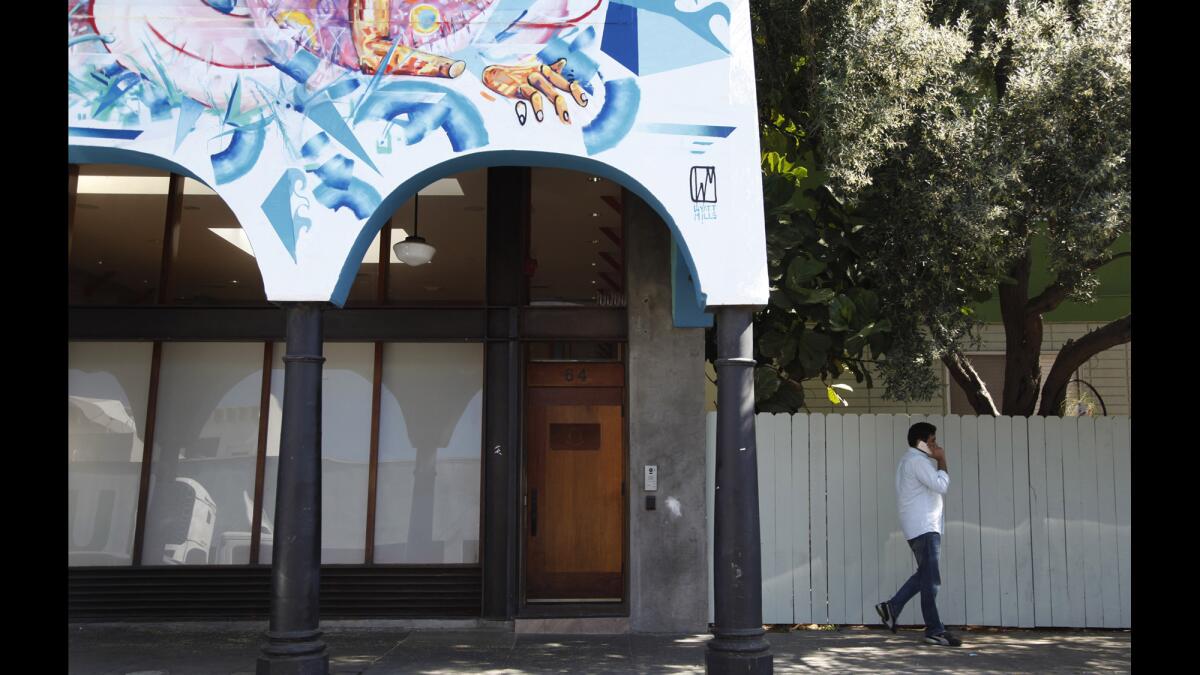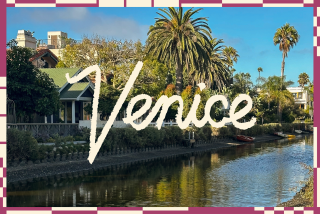Is Snapchat’s rapid growth changing Venice’s funky vibe?

Snapchat leases a handful of buildings along Market Street in Venice.
Snapchat first set up in Los Angeles in a funky old bungalow on Venice Beach, a little start-up with only 14 employees. Two years later, the messaging app is rich, famous and expanding fast.
The company is still in Venice, but with 200 employees it has far outgrown its cozy house on the beach. It’s about to nearly double its footprint in Venice with a lease for 40,000 square feet in several buildings at Venice and Abbot Kinney boulevards, according to real estate experts and property records.
------------
FOR THE RECORD:
Snapchat expansion: In the March 31 Section A, an article about the expansion of tech company Snapchat in Venice Beach said that Google was moving its operation from Venice to Playa Vista. Some employees will remain in Venice. In addition, the article misspelled Venice resident Jack Hoffmann’s name as Hoffman.
------------
Some residents say the tech company’s rapid expansion will alter the character of Venice, a longtime enclave for poets, artists, musicians, roller skaters, beach freaks and unclassifiable eccentrics. They gripe about a continuing influx of well-heeled techies who’ve made Venice a more expensive place to live and do business.
As “Silicon Beach” expands, it’s bound to transform the laid-back environment that has attracted dozens of start-ups. Snapchat, the most famous — and highest-valued — start-up in Los Angeles, serves as a lightning rod for foes of gentrification.
“The clock can’t be turned back after Venice is built out to support large corporations and not small businesses,” said James Briggs, chief executive of Briabe Mobile Inc., a mobile marketing company and tenant at the Abbot Kinney complex since 2007.
The frictions caused by tech industry gentrification are not new. Similar dramas are playing out in San Francisco and other old-line communities disrupted by Silicon Valley companies. Luxurious private buses filled with tech workers have become a vivid metaphor for the widening wealth gap in San Francisco.
Snapchat Chief Executive Evan Spiegel, who grew up in Los Angeles and attended Stanford University, said he chose Southern California to escape both corporate and Silicon Valley culture. Walks on the beach helped Spiegel and his business partner Bobby Murphy dream up new features for the app.
If it continues to expand in Venice, though, it will have to grow horizontally. And growth for Snapchat, with a reputed value of $15 billion, a growing list of features, and millions of users around the world, appears inevitable.
With its low-slung structures, bad traffic and lack of parking, Venice isn’t a natural spot for companies with hundreds of employees. In fact, Google recently announced that it would expand its Southern California operations beyond Venice to a massive new office park in Playa Vista with nine times more space.
Snapchat’s latest expansion will displace about three dozen tenants, most on month-to-month leases, who could receive an eviction notice from Snapchat as soon as June 1. Near its Market Street headquarters, the company has displaced a youth shelter, an art studio and, by next year, probably a tavern.
Several tenants at the Abbot Kinney complex said they’ve sensed for a while that their days there are numbered. Office lease prices in Venice have doubled to an average of $5.82 a square foot per month since 2011 while the vacancy rate has dropped by more than half, to 10%, according to data from real estate firm CBRE. In the broader West L.A. market, lease rates rose 27% and vacancy fell by a fifth.
The median rent for housing in Venice has surged more than 50% over the last two years to $3,100 a month in the first quarter of this year, matching Santa Monica’s median, which has risen 6%, according to real estate website Trulia.
“It’s basically a landlord market there,” said David Thind, an agent at Coldwell Banker Commercial. “There’s retail tenants and tech firms from around the world that want a Venice address.”
“For us, the tenants, it’s not a good situation,” said Jim Higgins, chief executive at the IT consulting firm EWireless 1, another Abbot Kinney tenant. “My eyes are open, but it’s very expensive.” Alternatives in Venice would cost at least 30% to 50% more than he’s paying now, and he’s not sure he can afford that, he said.
Kim Gordon, who moved her interior design studio to the complex in June, thinks politicians should step in.
“It would have been fantastic for the mayor or the city to come up with something truly terrific for the community here instead of just having one big hog that might not be around in five years,” she said.
One person’s big hog is another person’s economic development engine, however. A spokeswoman for Los Angeles Mayor Eric Garcetti declined to comment. A spokesman for city councilman Mike Bonin, who represents Venice, did not respond. Property owner Eric Swepston declined to comment, citing ongoing negotiations.
Venice has always been a bit odd. It was created as a real estate development in 1905 by Abbot Kinney, who called it Venice-in-America. Kinney dug out canals to suit the theme; most were filled in a few years later. In the 1950s and 1960s, beatniks and hippies made it their home. Real estate values have risen over the decades but the area has maintained a hip image. In 2012, GQ magazine named Abbot Kinney Boulevard “the Coolest Block in America.”
Spiegel apparently thinks the place is cool too. Even after outgrowing its beachfront bungalow in 2013, he kept Snapchat in Venice. The company now leases a handful of buildings on nearby Market Street, and the few other businesses that remain fear they could be squeezed out in coming years.
In January, the company quietly expanded slightly north, signing a three-year lease at Thornton Lofts for a 25,000-square-foot live-and-work space along the people-watcher’s paradise known as Ocean Front Walk.
Some residents think Spiegel’s love for Venice is misguided. “Snapchat wants to be associated with the Venice lifestyle, but it’s overburdening the community and destroying its diversity,” said Levi Brooks, chief executive of digital strategy firm Use All Five. “It doesn’t make sense.”
Others welcome Snapchat’s expansion. Jack Hoffmann, who lives across from Snapchat’s headquarters, said the company’s presence has kept the street clean and reduced violence.
“If Venice is about anything, it’s about dynamic change and we’re seeing it,” Hoffmann said.
Jim Murez, manager of the Venice Farmers Market, said the changing economy has naturally priced out “starving artists” in favor of companies pursuing “new art forms in the digital world.”
“Is having a Snapchat better or worse than a mom-and-pop production company?” Murez said. “It’s neither. It’s just different.”
Snapchat declined to discuss real estate matters on the record. A spokesperson said by email, “We love being in Venice and we strive to be great neighbors within the community where we live and work.”
Twitter: @peard33
More to Read
Inside the business of entertainment
The Wide Shot brings you news, analysis and insights on everything from streaming wars to production — and what it all means for the future.
You may occasionally receive promotional content from the Los Angeles Times.











